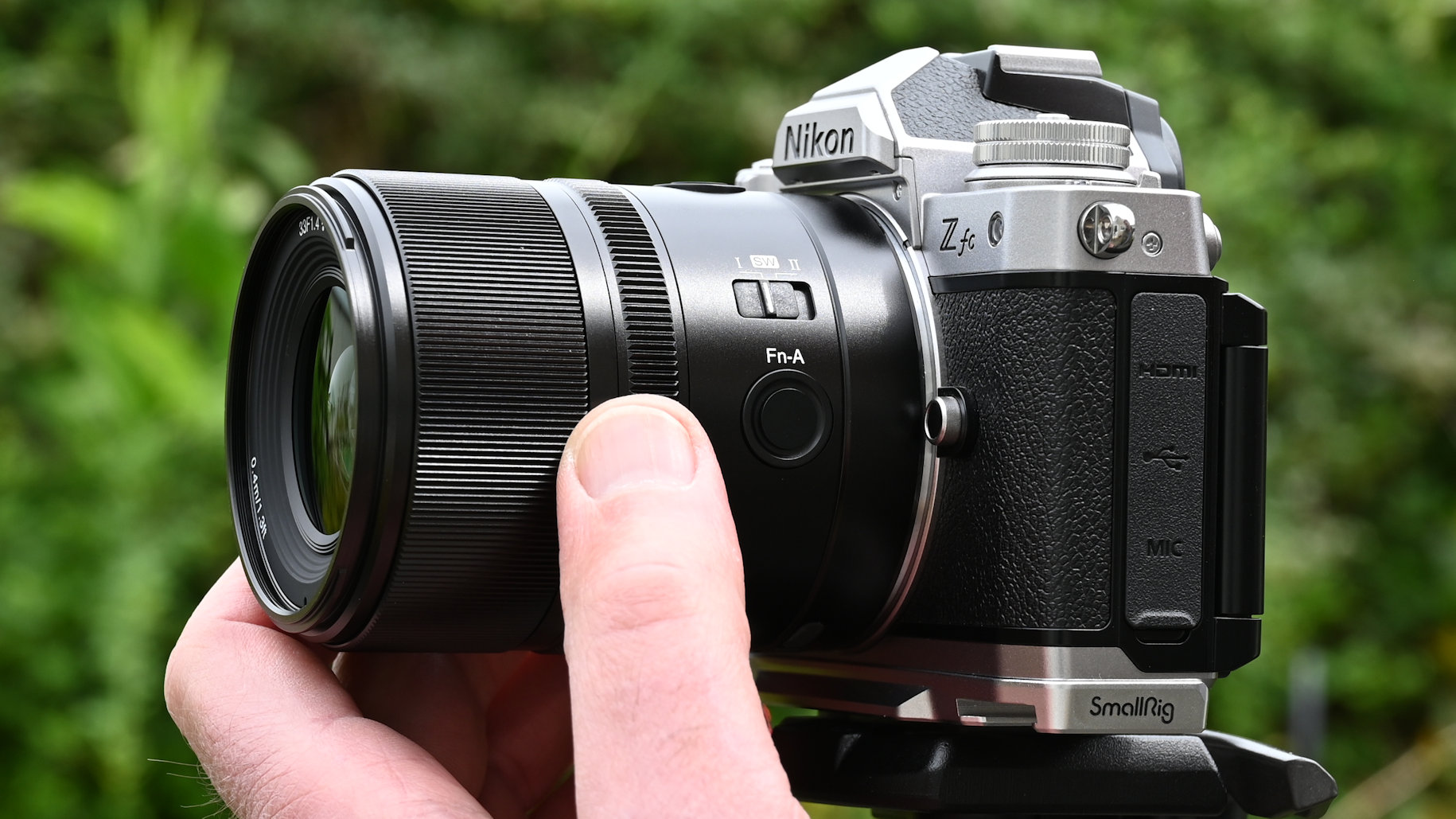
The Yongnuo YN33mm F1.4 DA DSM WL Pro is a tempting proposition. Like most photographers, I’ve always loved the natural perspective and fast aperture of a ‘nifty fifty’, at least on full-frame cameras. This APS-C format lens gives the same viewing angle with an ‘effective’ 50mm focal length, and a fast f/1.4 aperture rating that leaves ‘trinity’ f/2.8 zooms for dead.
I’ve been impressed in the past with Yongnuo primes for both APS-C and full-frame cameras, which I’ve found deliver impressive performance at an outrageously competitive selling price, but this one adds something new, with built-in radio frequency communication.
As such, it aims to be one of the best lenses for the Sony A6700, the best lenses for the Nikon Z fc, and the best lenses for the Fujifilm X-T5 cameras, and other bodies in the same APS-C ranges as those cameras.
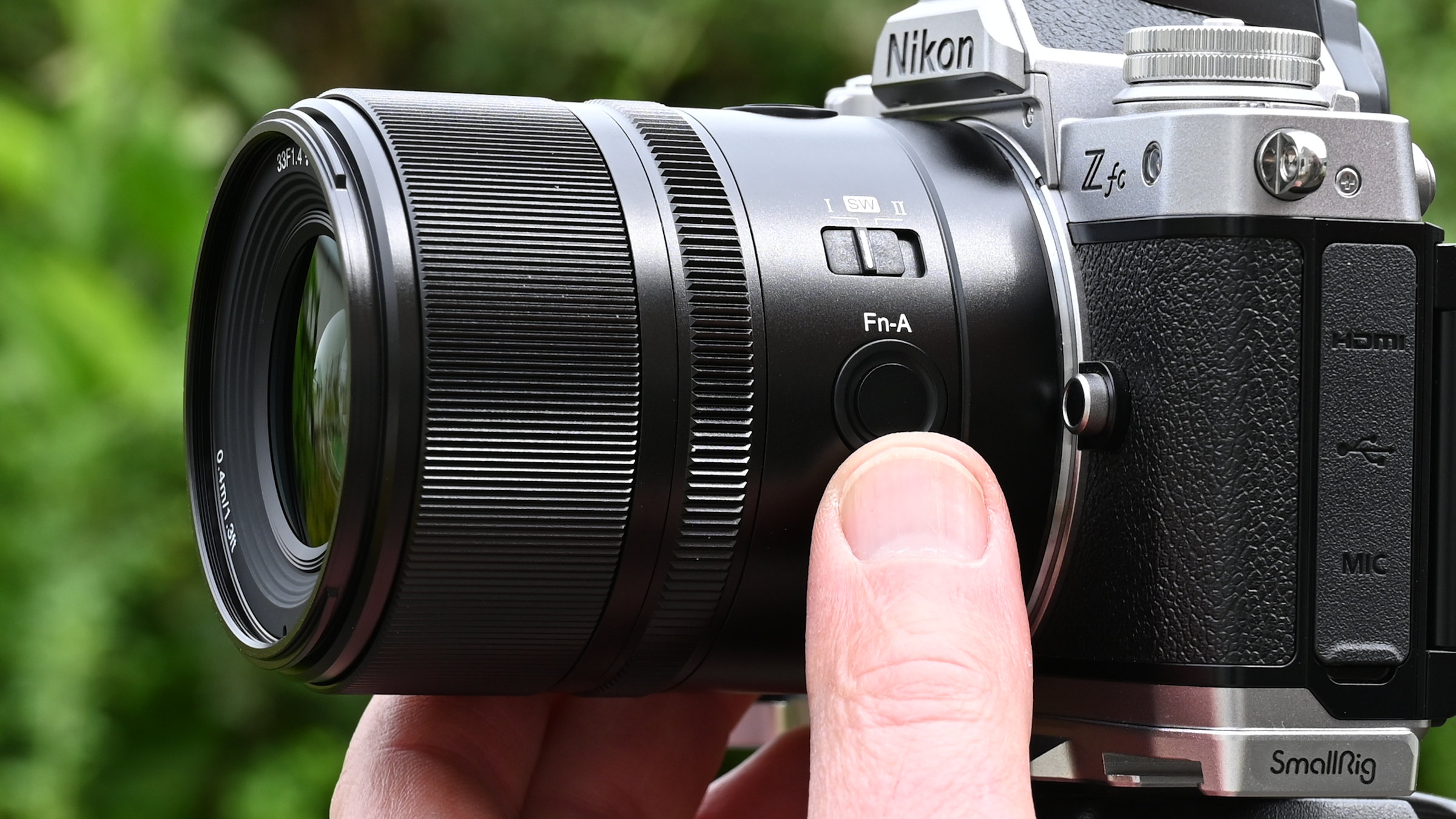
Yongnuo YN33mm F1.4 Pro: Specifications
Yongnuo YN33mm F1.4 Pro: Price
The Yongnuo YN33mm F1.4 DA DSM WL Pro is available in Nikon Z (DX), Sony E, and Fujifilm X mount options at a price of around $268 / £215. That works out to a big saving compared with the own-brand Sony E 35mm F1.8 OSS at $423 / £325 and the Fujifilm XF 33mm F1.4 R LM WR at $699 / £699.
The closest Nikon equivalent is the Nikon Z DX 24mm F1.7 at $277 / £269 which, like the Sony, not only has a slower aperture rating but also a wider than standard viewing angle, equating to a 36mm in full-frame terms. Other independent competitors include the Sigma 30mm F1.4 DC DN | C at $339 / £319 and the Viltrox AF 33mm F1.4 at $299 / £227. That makes the Yongnuo lens look potentially great value against all of these apart from the similarly inexpensive Viltrox.
One thing that sets the Yongnuo apart is that you can buy the Yongnuo BR-L1 remote control 2.4GHz as an optional extra for around $59 / £47, as I’ll come to later.
Yongnuo YN33mm F1.4 Pro: Design & Handling
I got hold of the Z (DX) mount version of the lens to use with my Nikon Z fc. I felt that the compact 69x89mm dimensions and 378g lightweight build made the lens feel immediately at home on the camera body, and the same would apply to Sony and Fujifilm APS-C format mirrorless cameras. Although small and light, the lens feels well-built and features extensive weather seals, including a rubber gasket on the mounting plate, which is made from chrome-plated metal rather than plastic and features gold-plated electronic contacts. There’s a fluorine coating on the front element, to repel moisture and grease.
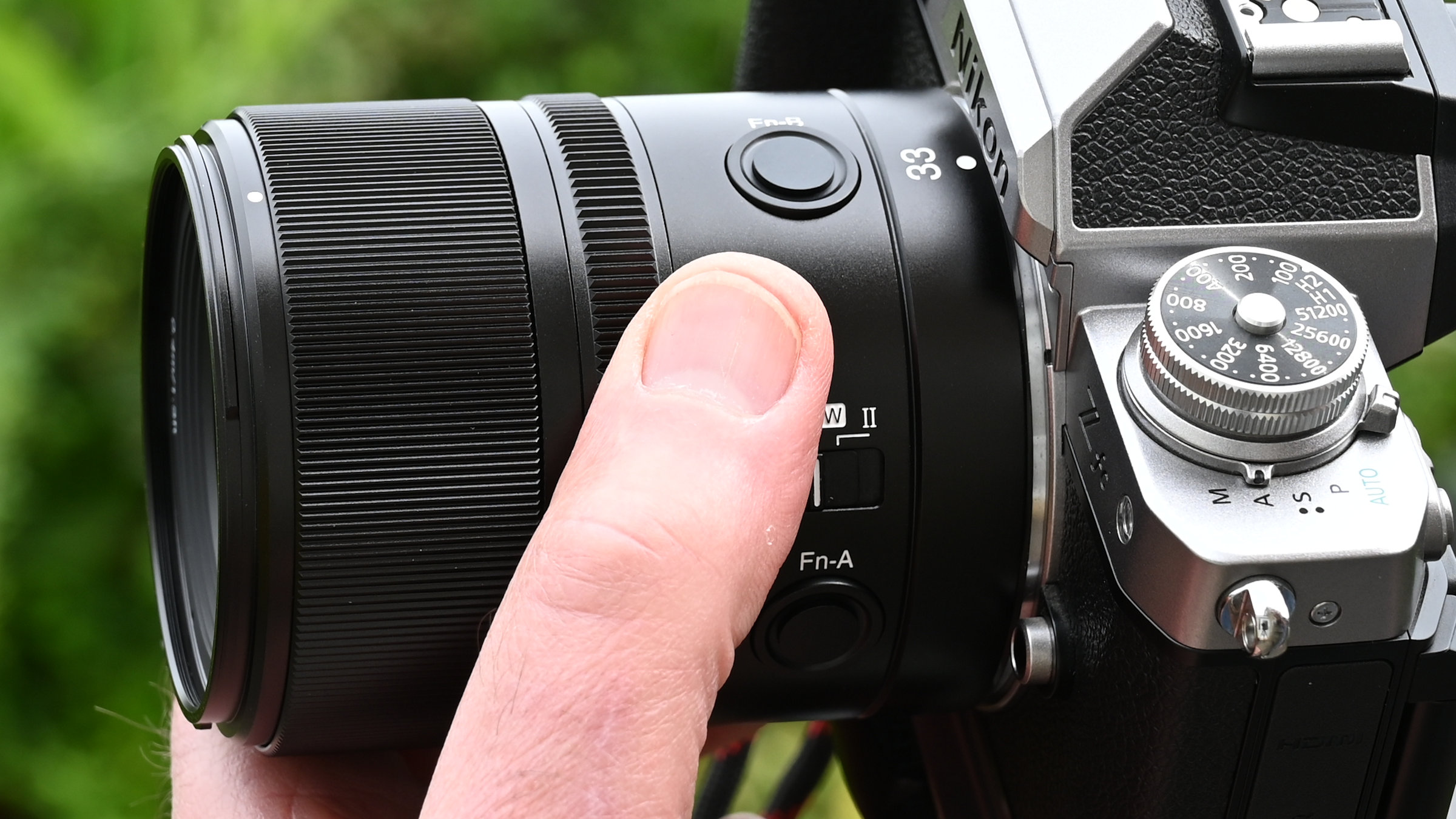
Despite the down-market price tag, the lens has some quality glass. The total count of 11 elements includes two LD (Low Dispersion) elements and four HRI (High Refractive Index). Yongnuo’s ‘Nano’ multi-layer coating is also applied to minimize ghosting and flare. I like the fast f/1.4 aperture rating and that the diaphragm is based on nine blades, making it better rounded than the seven blades often featured in competing lenses.
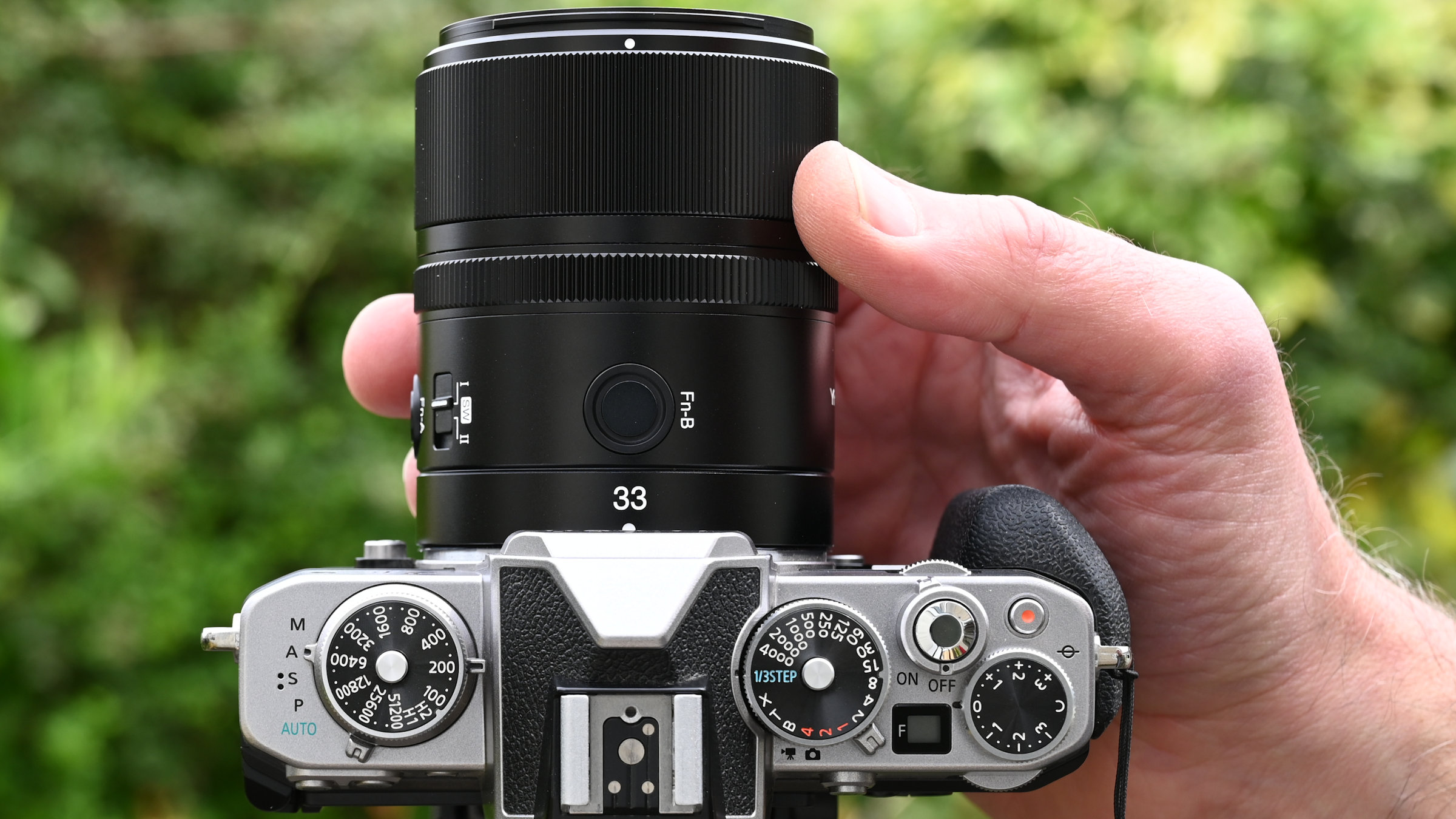
There’s no shortage of electronics packed into the lens. Autofocus is courtesy of the now common and typically fast, near-silent linear stepping motor variety. It comes with the usual electronically coupled manual control ring and there’s a further narrow control ring just behind it, nominally for de-clicked aperture control but both rings are customizable.
My only gripe in terms of handling is that the ‘aperture’ control ring turns very easily with practically no resistance and I found I was continually nudging the aperture away from what I wanted it to be. The answer, on my Nikon Z fc at least, was to disable the control ring altogether in the camera’s custom settings menu, and only enable it when I actually wanted to use it.
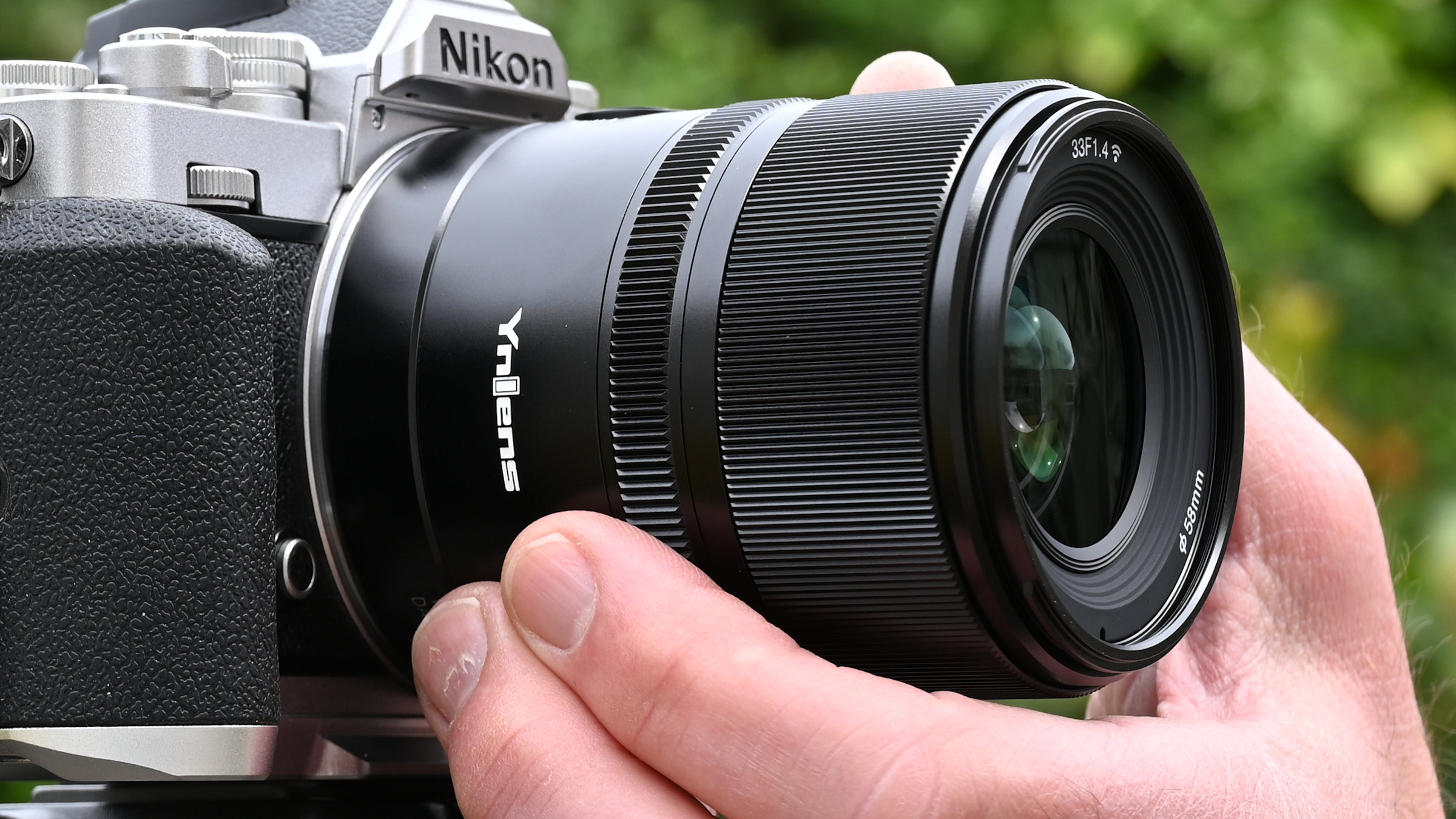
Next up there are two L-Fn (Lens Function) buttons. Again, these work independently and can be assigned to the same or different functions. Normally I’d use them both for autofocus-hold, so they fall naturally under the thumb in both landscape and portrait orientation shooting. There’s also what looks like an AF/MF switch but is labelled SW I and II. You can use it for switching between autofocus and manual focus, but also for handing over control to the optional 2.4GHz RF wireless Yongnuo BR-L1 remote control.
The handily small controller features an on/off switch, Fn button, A and B buttons, a rotary dial and a little mono LCD screen. After pairing it with the lens, you can use it for adjusting the aperture and for manual focusing, as well as for A-B focusing, where you can shift between two preset focus distances as well as setting the speed of the transition.
The Fn button on the remote controller replicates the setting of the Fn button on the lens. Both the lens and the optional remote feature USB-C ports for applying firmware updates, and the remote’s port is also used for charging its internal battery.
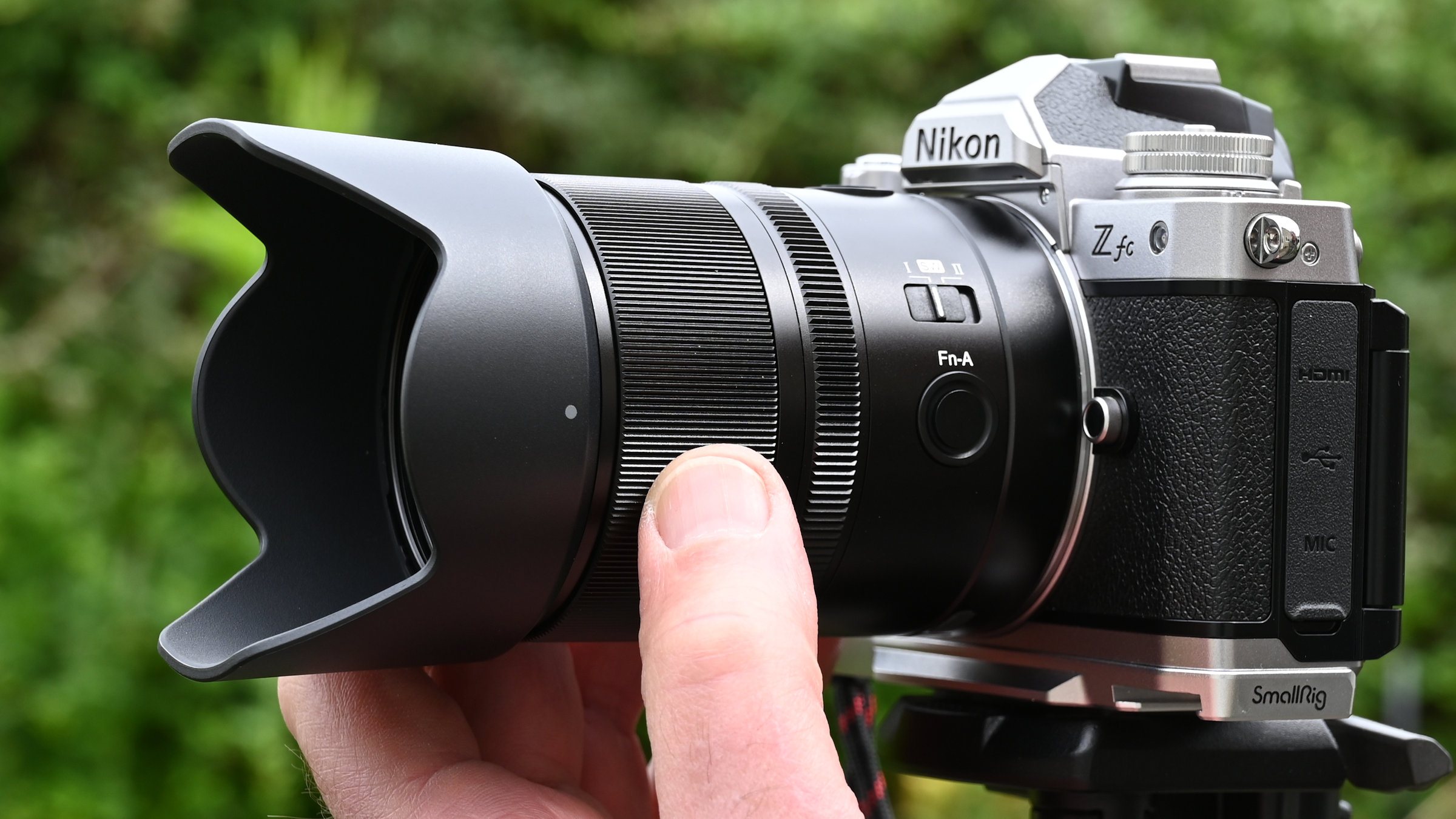
To me, the remote controller feels a bit plasticky and it’s not entirely straightforward to use. Even so, it’s worth the money and can be used with any Yongnuo lens that features wireless remote compatibility, although you have to repeat the pairing process each time around.
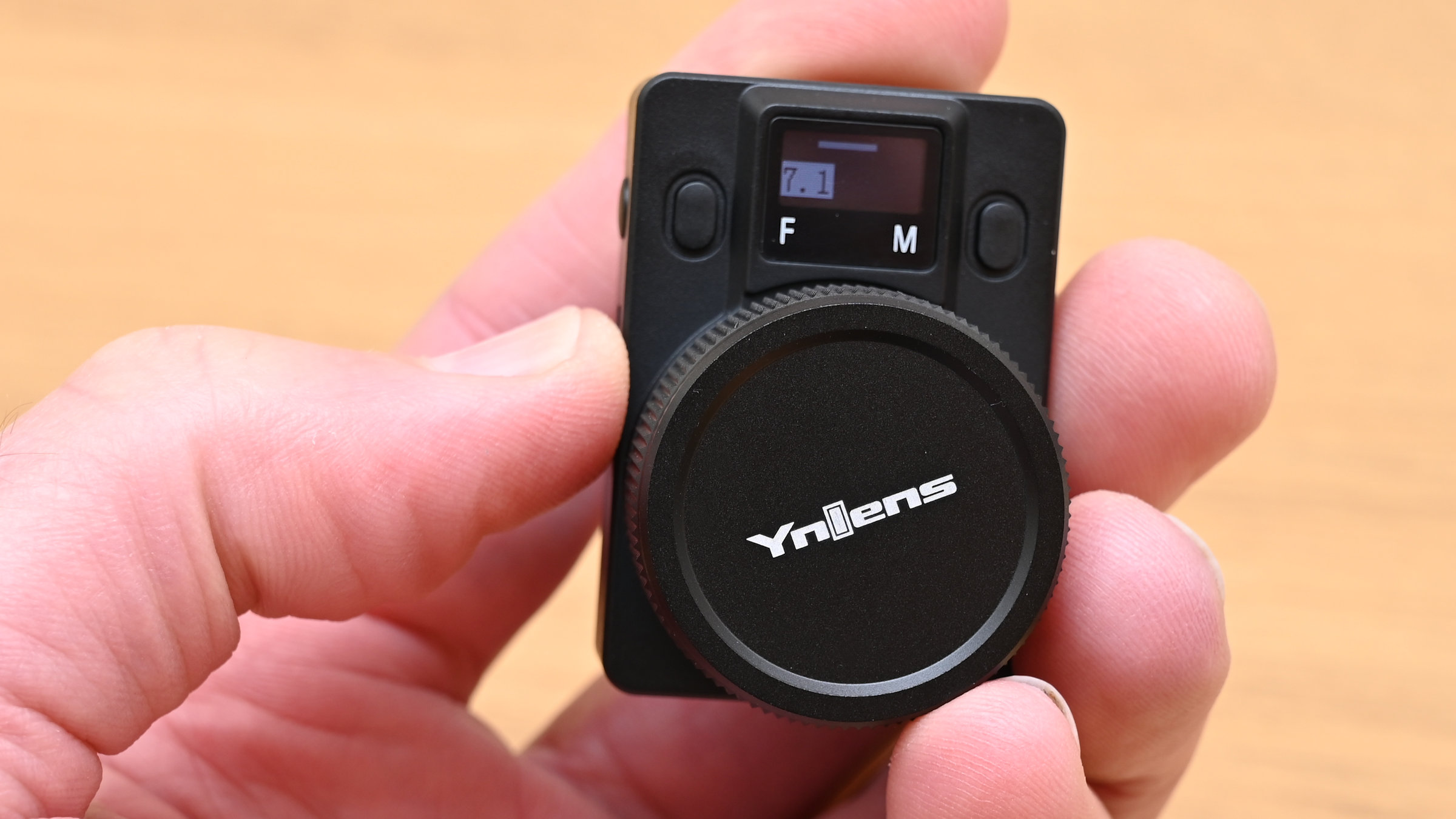
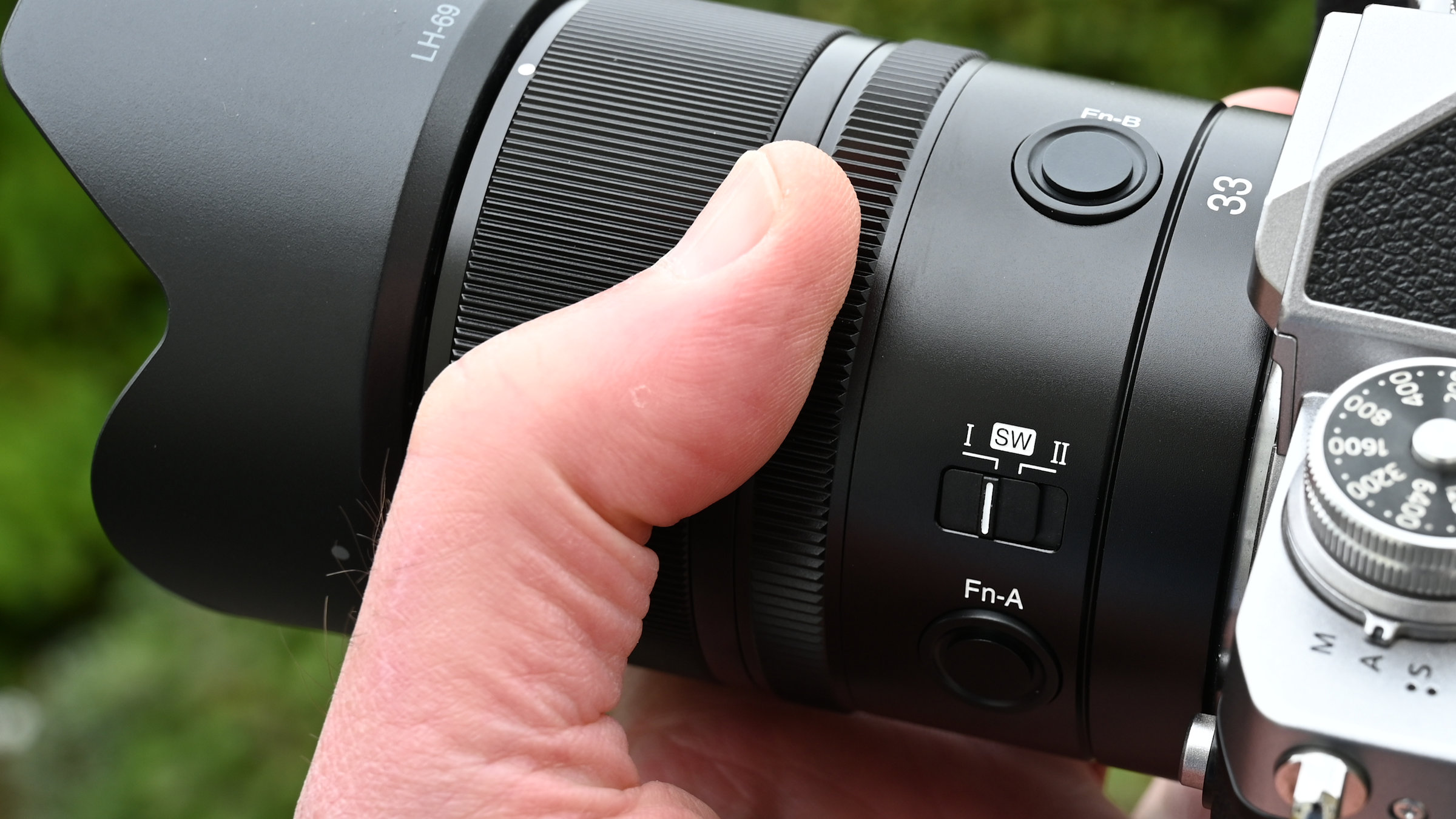
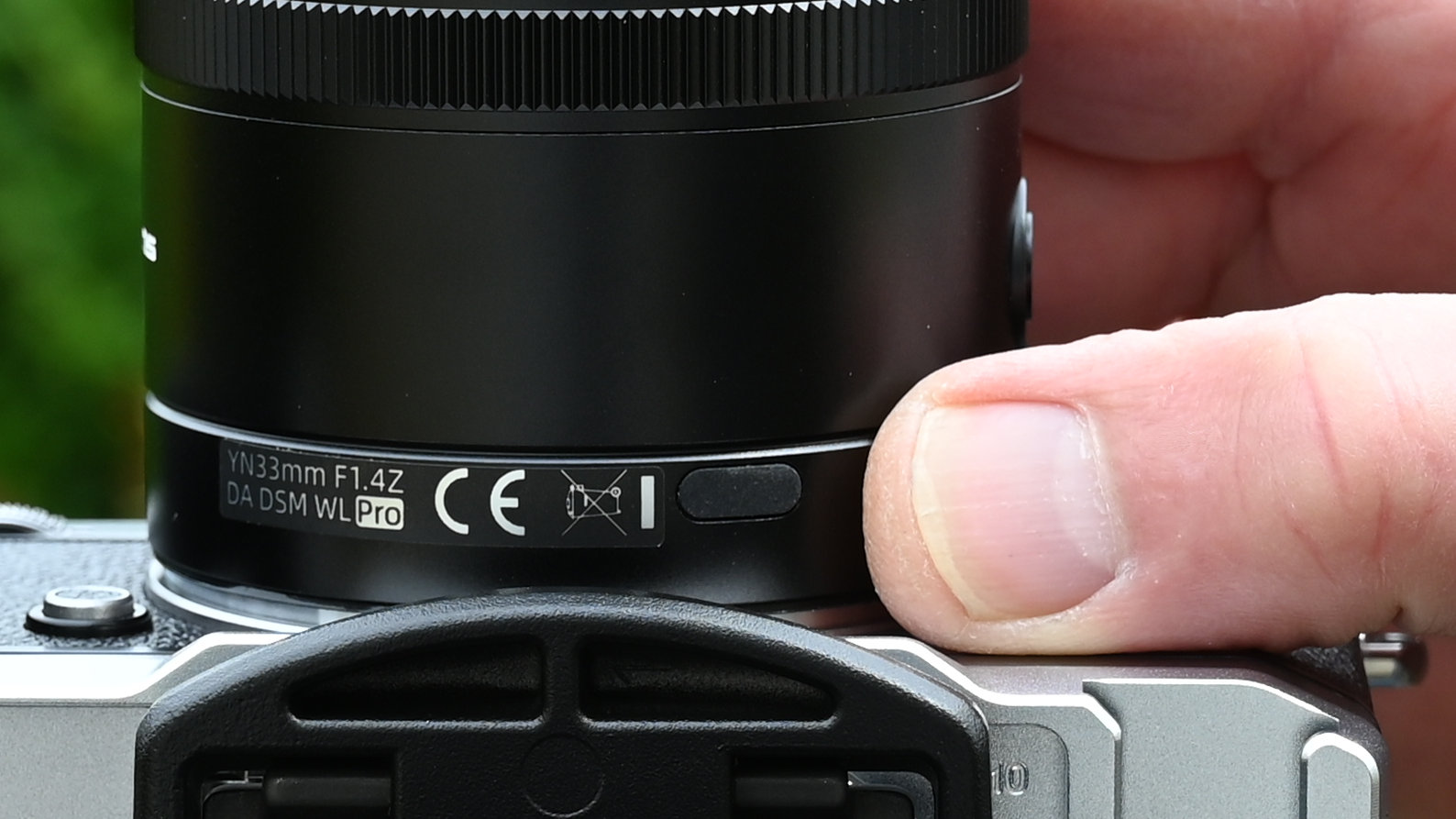
Yongnuo YN33mm F1.4 Pro: Performance
The fast f/1.4 aperture brings the prospect of maintaining quick shutter speeds under low lighting conditions and, more importantly for me, gaining a tight depth of field for isolating subjects against a blurred background. Bokeh is an important factor with this type of lens and the Yongnuo does well to produce good smoothness in defocused areas. The nine-blade aperture helps to retain well-rounded bokeh disks when stopping down a little.
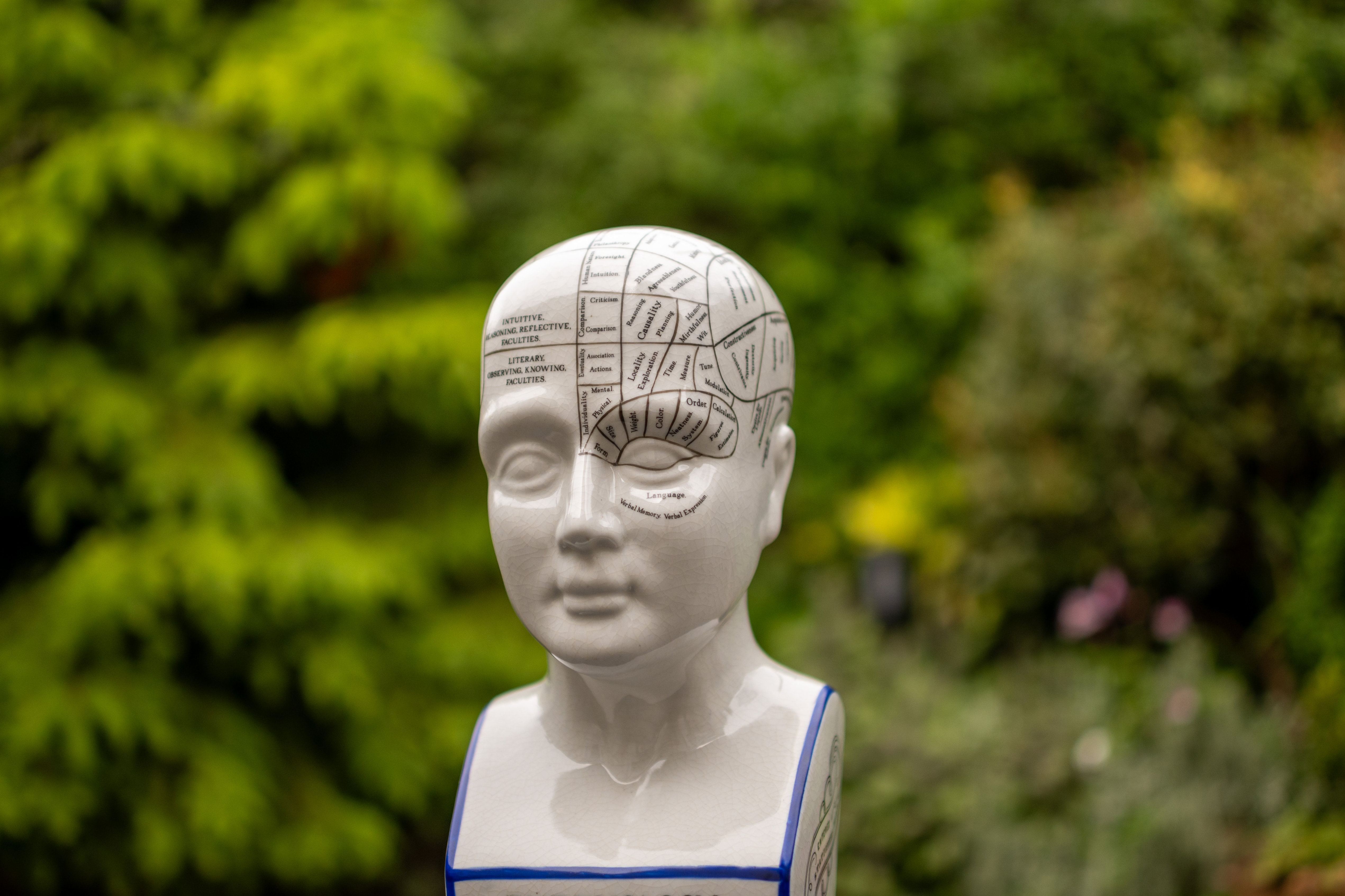
I noticed a little axial chromatic aberration (aka bokeh fringing) when shooting wide-open. It’s often a problem with ‘fast’ lenses, causing color fringing around high-contrast edges just in front of and behind the plane of focus, anywhere across the entire image frame instead of being confined to the edges and corners. Even so, the Yongnuo does better at controlling this aberration than the competing Sigma 30mm F1.4 DC DN | C lens.
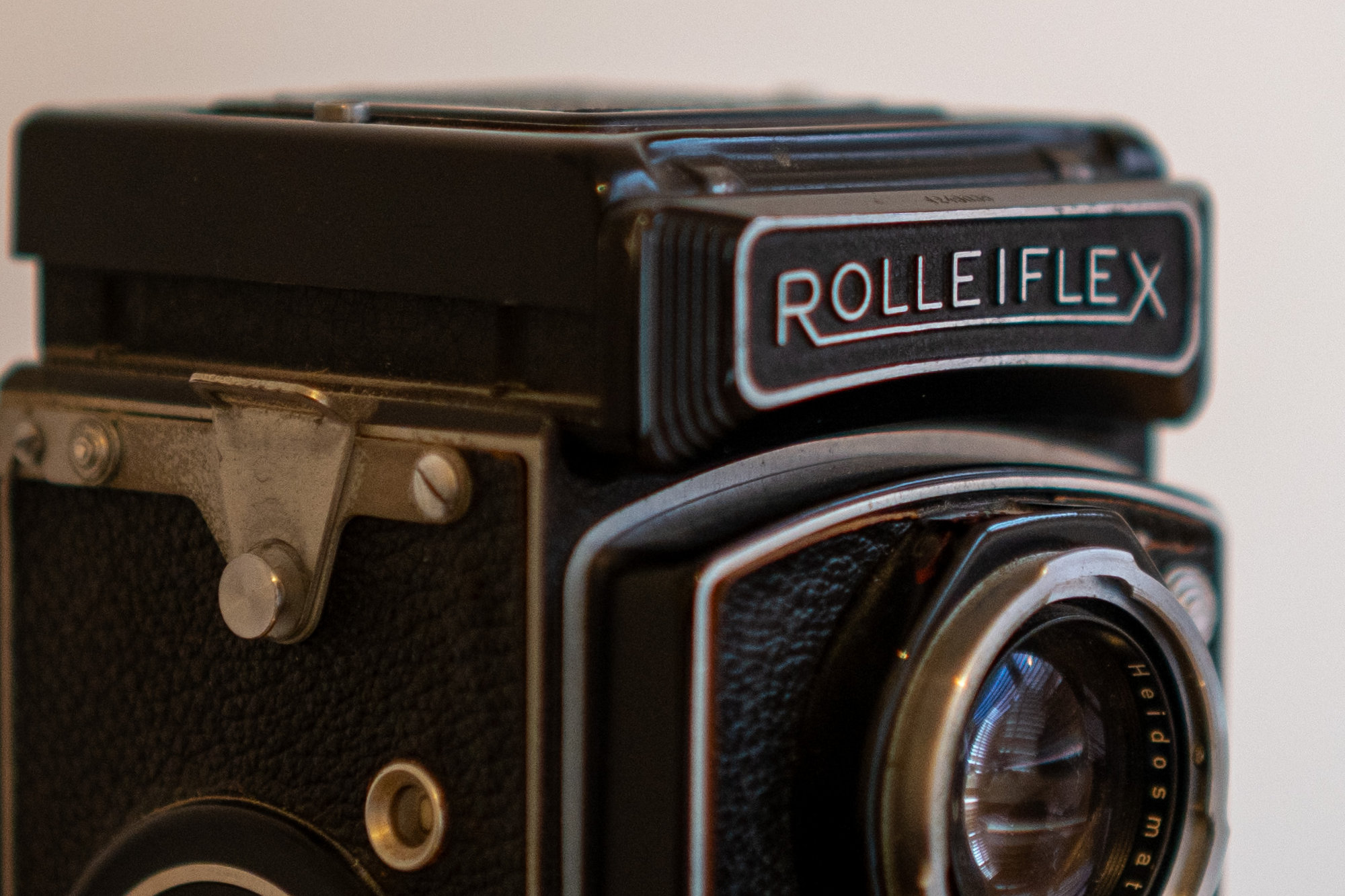
Center-sharpness is very good wide-open at f/1.4, becoming excellent at f/2 and narrower apertures. For really good edge/corner sharpness, it’s best to stop down f/2.8 or preferably somewhere between f/4 and f/11, which is exactly what I’d expect. Color fringing in terms of lateral chromatic aberration is very minimal even out at the edges and corners of the frame, throughout the entire aperture range. Barrel distortion can be noticeable but can generally be taken care of by automatic in-camera correction, or at the editing stage. All things considered, Yongnuo’s performance is very good indeed.

Yongnuo YN33mm F1.4 Pro: Sample Images
The following gallery of example images was mostly shot in the Bishop’s Palace & Gardens, situated in the Somerset city of Wells in the UK. I used my trusty Nikon Z fc for testing the lens.



















Yongnuo YN33mm F1.4 Pro: Lab Results
We run a range of lab tests under controlled conditions, using the Imatest Master testing suite. Photos of test charts are taken across the range of apertures and zooms (where available), then analyzed for sharpness, distortion and chromatic aberrations.
We use Imatest SFR (spatial frequency response) charts and analysis software to plot lens resolution at the center of the image frame, corners and mid-point distances, across the range of aperture settings and, with zoom lenses, at four different focal lengths. The tests also measure distortion and color fringing (chromatic aberration).
Sharpness:
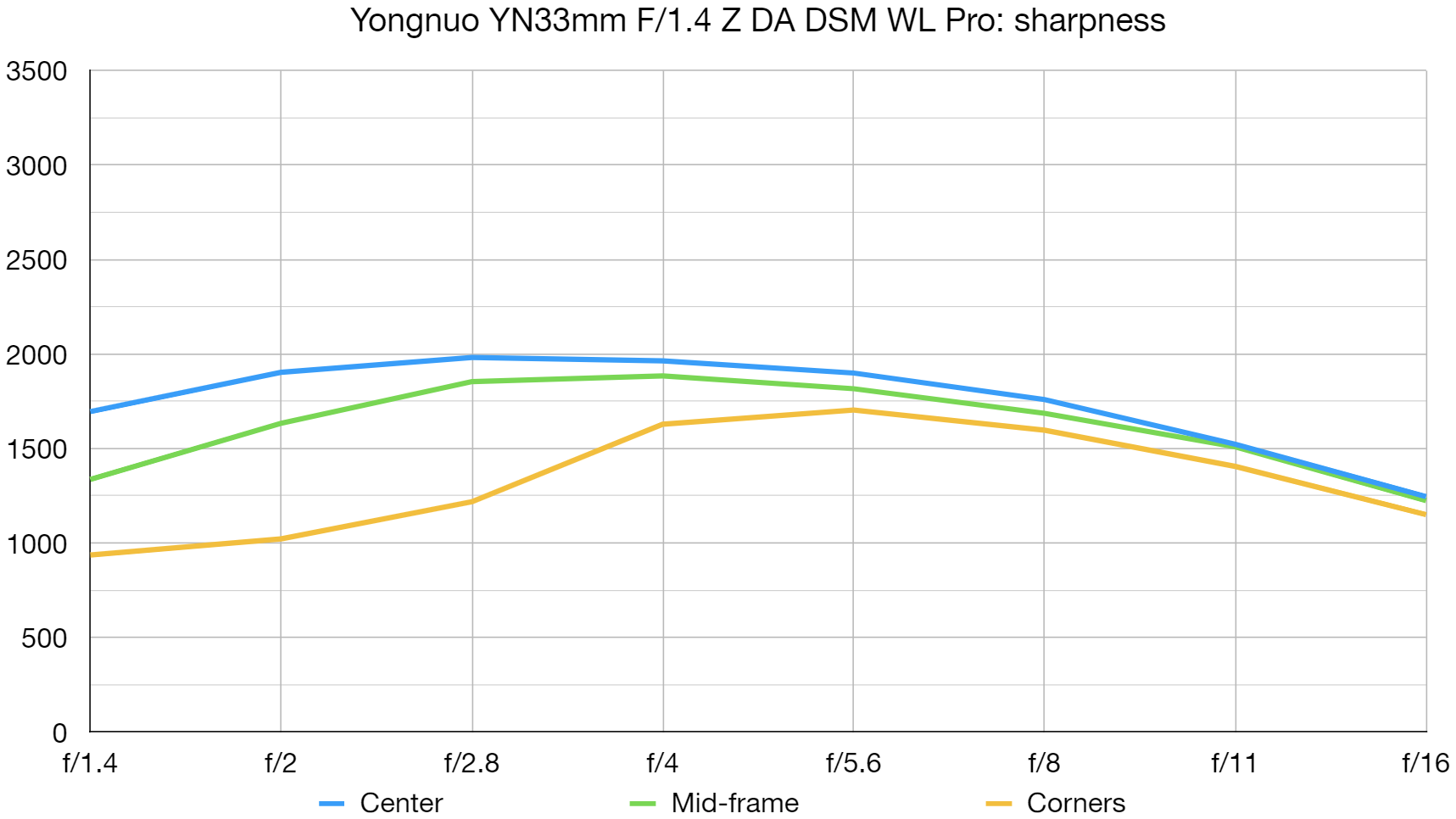
Sharpness from the center of the frame to the extreme edges is pretty good at f/1.4. Levels of center-sharpness are impressive between f/2 and f/8, while edge/corner-sharpness comes on strong between f/4 and f/11.
Fringing:
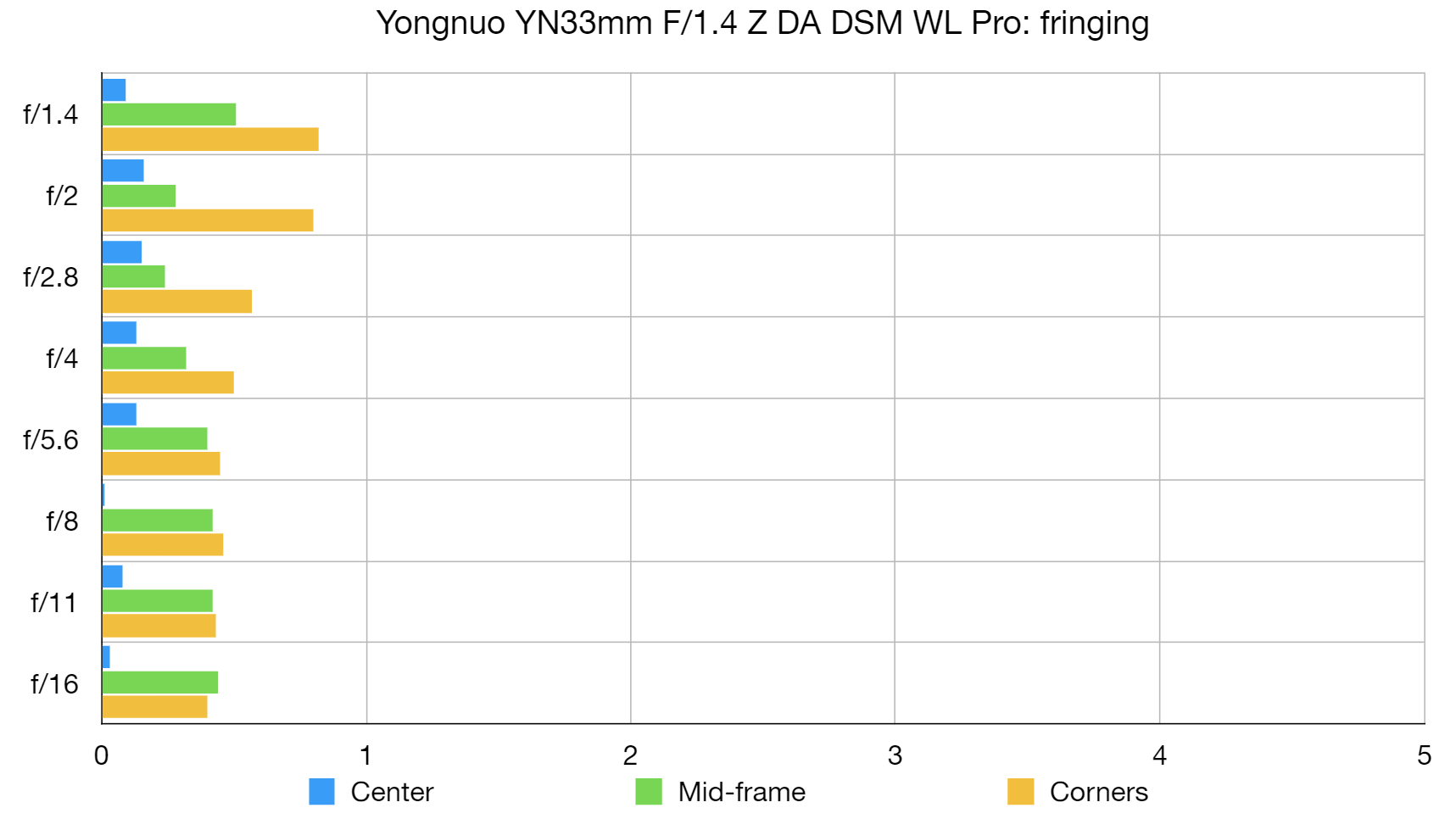
Levels of color fringing are very well controlled throughout the entire aperture range, not requiring any help from automatic in-camera correction.
Distortion: -2.7
Barrel distortion can be noticeable but is nevertheless of a fairly low order compared with many lenses for mirrorless cameras. As such, there’s the option of enabling or disabling automatic in-camera correction, rather than having it ‘forced on’.
Yongnuo YN33mm F1.4 Pro: Verdict
I like that there’s a lot packed into this little lens. I like the dual-function buttons and dual control rings, the smaller one of which I’d generally for aperture control. I’m not so happy that this ring doesn’t have the option of click steps or a lockable Auto position but I can understand the omission of a ‘multi-function’ control ring. Image quality is very satisfying and autofocus proved consistently accurate in my tests, which are major plus points. I’m not sure that I’d ever use the optional wireless controller, but it works and is a neat extra if you feel the need. Ultimately, it’s a very nice compact lens and great value for money.
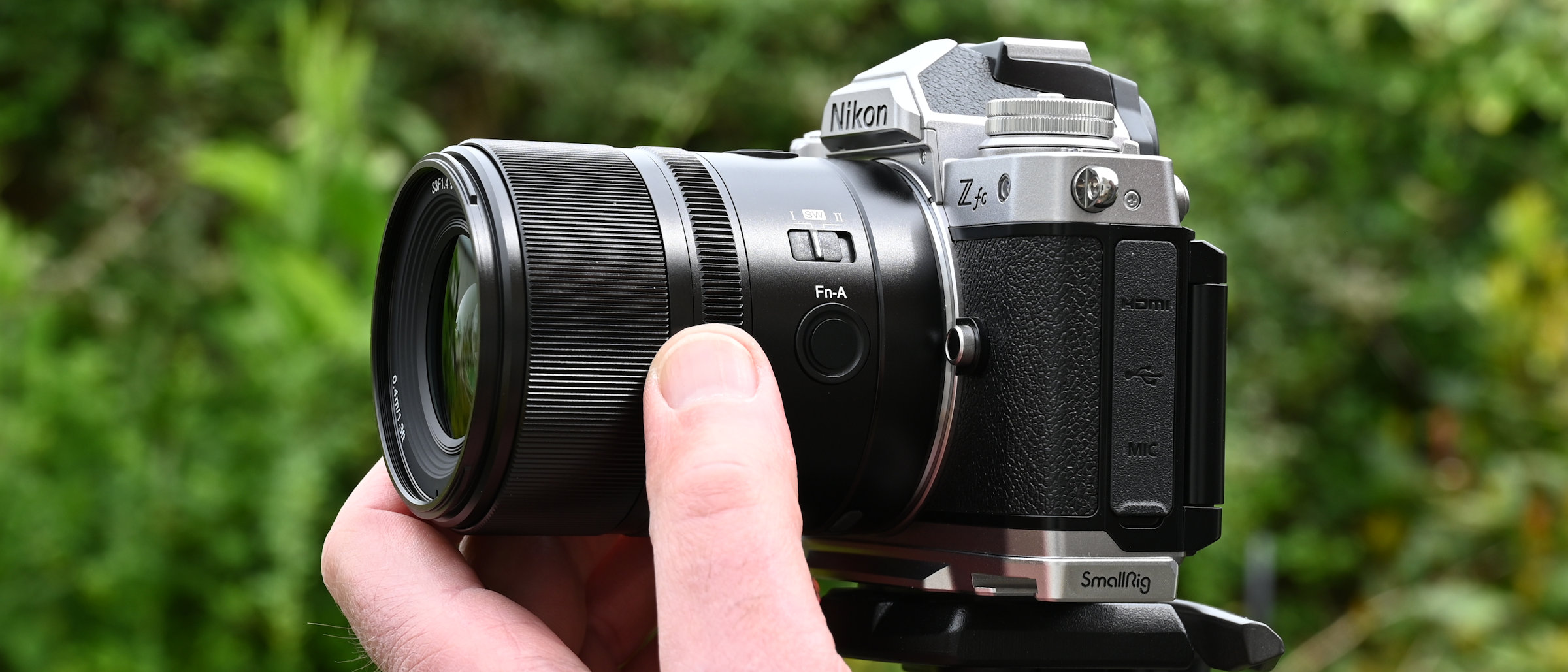
Should you buy the Yongnuo YN33mm F1.4 Pro?
✅ Buy this...
- You’re after a fast standard prime for your APS-C format Nikon Z, Sony E or Fujifilm X mount mirrorless camera, and you’re in the market for a bargain.
- You like the idea of using a lens with an optional RF remote controller. The A-B focus distance setup works well for shooting video.
🚫 Don't buy this...
- You’d rather spend the extra money on an own-brand Fujifilm or Sony lens, although there’s not yet a fast ‘standard prime’ in APS-C format from Nikon.
- You’d prefer the versatility of a zoom lens and don’t feel the need for a standard prime with a faster aperture rating.







